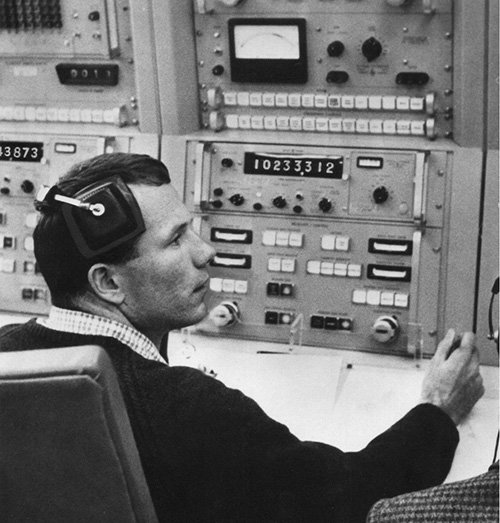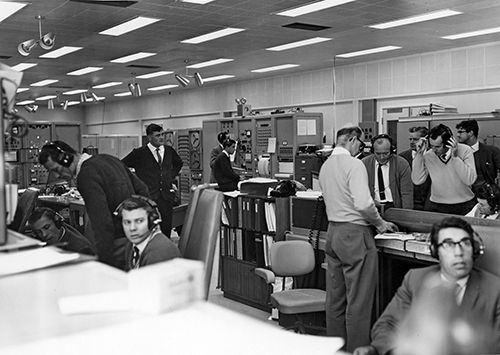Bruce Window at the Tidbinbilla receivers at the time of encounter.
Mariner IV Stories at Tidbinbilla
Bruce Window remembers:
Bruce Window at the Tidbinbilla receivers at the time of encounter. |
|
(Part 2 of Bruce’s interview – starting 10:00 into part 2. |
I was a Receiver Operator on shift until the day of the spacecraft arriving in the vicinity of Mars. That was a pretty exciting time that had been built up. with the expectation that we would be perfect and we didn’t want any hitches.
In fact I’ve got a letter which I wrote to my mother, which is dated Monday the 19th of July 1965…
“Also I guess you heard about the Mariner on the news. On the day of encounter they had all the press out at the station and had closed circuit TV to show them what was going on.
It was a muckup right from the start – with people in a panic everywhere, and this made things ever more difficult than they really were.
To start with, there were incorrect predictions, and so it took me 8 minutes to find the signal after it had come over the horizon. Not that anything was lost, because the station at Goldstone was tracking at that time.Then, later, when the thing went behind Mars, the Operations chief here had a long discussion with the mission directors to try and get some better predictions for when it came out from behind Mars.
Also, during this time, we all had lunch, as best we could. I didn’t trust time going to a barbecue, so I took sandwiches.
Anyway, about thirty seconds before the signal was due to arrive back on Earth, they gave us a new set of predictions, and then there was a scramble to set up the new figures.
As I was tuning the receiver, I heard the signal, and we were the first station to make contact after the encounter.
Later on in the afternoon, the operations manager asked the two of us operating the receivers to go and have an interview with the press. Anything you read in the papers need not necessarily have been said. It certainly is a marvellous achievement the Yanks have done.”
and John Heath writes:
DSS-42 Operations during the first track of Mariner IV, January 1965. John Heath is at the far right of the photo. Preserved by Les Whaley, 2025 re-scan by Colin Mackellar. |
My recollections of that exciting time back in the mid 1960s are dominated not so much by the anxious events that culminated in the Mariner IV fly by of Mars but of the events just prior to our first track of that spacecraft that occurred a few months earlier (which was incidentally, also our first track of any spacecraft and consequently quite a harrowing time for the station staff).
It was particularly harrowing for me as there were two troublesome systems that were critical to the success of the operation and they were both RF systems.
The first was the transmitter system that was required to send commands that were essential to the operation of the spacecraft. This system was experiencing irregular ‘drop outs’ – i.e. it switched itself off for some reason associated with the coolant flow. At the time the responsibility for the transmitter rested with my boss Allan Lum.
The other problem system was the maser, which was my responsibility. The maser was a recent incredible breakthrough in low noise microwave amplifiers that lowered the threshold of microwave receivers by about 8 db. This enabled much higher data rates or similar data rates over much greater distances to be achieved. The maser achieved this remarkable performance by operating at liquid helium temperatures of approximately 4.5 Degrees K, and the problem was achieving and maintaining this very low temperature. This was something of a hit or miss exercise as it required 12 to 14 hours to cool the maser down to liquid helium temperature and nearly as long for it to warm back up to room temperature so if, for any reason, the cool down to liquid helium temperature was interrupted, it could be as long as 24 hours before you could do anything about it and another 12 to 14 hours to find out if you had overcome the problem.
As you can appreciate, having two critical systems performing so unreliably was not conducive to a high level of confidence going into our first track, and this lead to some fractious exchanges between Allan and the Station Director Bob Leslie and between Bob and myself. As things eventuated, the transmitter only dropped out once at a non-critical time, and through the efforts of my two staff Geoff Rose and Mal Lee and myself, the maser performed well. In addition, it led to my boss resigning and me inheriting the transmitter.
Distant happy memories!

